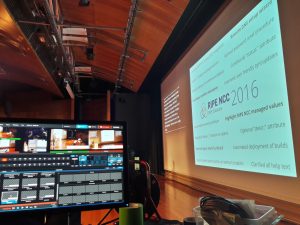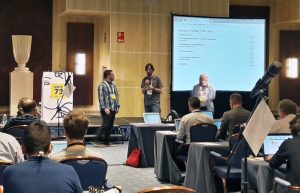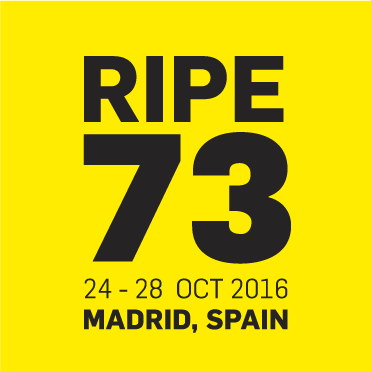Thursday was a busy day at RIPE 73 with 614 attendees checked-in (of 660 registered) and plenty of parallel sessions taking place through the day.
In the Routing Working Group session, Alexander Azimov reported that his work on “ISP Border Definition” has become an IETF draft, with a second draft to be submitted to the IETF soon. Job Snijders delivered a very well received presentation about “Large BGP Communities” and Ben Maddison gave a talk on MANRS. The RIPE NCC’s Robert Kisteleki closed the session with a brief report on the IXP Hackathon, which took place over the weekend.

Thursday in the RIPE 73 Main Hall
Meanwhile, over at the Cooperation Working Group session, RACI attendee and lawyer Joanna Kulesza posed some very interesting questions to the RIPE community and the technical community at large on cybersecurity due diligence. Achilleas Kemos presented the EU Commission’s plan to implement 5G fully by 2025, creating two million jobs. Finally, in an interactive panel, representatives of the Spanish and German governments described their plans for deploying IPv6, different routing strategies, and examined whether or not it makes sense for a government to have one or multiple prefixes.
After the morning coffee break, Cristoph Dietzel (DE-CIX) was first to present for the Open Source Working Group, giving a rundown on a new TCP dump BGP parser designed to overcome certain limitations on Internet routing behavior analysis. The other talks moved fast, leaving more time for lightning talks. Gert Doering gave an update on OpenVPN and Nick Hilliard presented on Bird’s Eye, a service for querying BIRD that he developed with his team during the IXP Hackathon. The working group chairs reminded attendees interested in presenting at RIPE 74 to contact them as soon as possible!
Over in the other room, in the Anti-Abuse Working Group session, Europol EC3 presented on issues regarding RIPE Database registration of sub-allocations and assignments, asking the community for help in drafting a solution. Gabi Nakbli presented research on the alteration of website traffic while in transit, where (advertising) links get replaced or inserted by third parties.
After lunch, the Database Working Group session started with the announcement that Job Snijders is stepping down as co-chair, and Nigel Titley will stay on as chair until a new co-chair is found to join Piotr Strzyżewski. After that, the current methodology of Numbered Work Items to guide proposals through the working group was discussed; the conclusion being that the system will remain. Tim Bruijnzeels gave his regular operational update, with lots of new functionality being introduced. After Piotr gave an update on the AFRINIC IRR homing project, Alex Band introduced the new workflow for setting up Reverse DNS.
In the DNS Working Group session Jim Reid announced that Shane Kerr would be appointed as the new DNS Working Group Co-Chair. Ondřej Surý presented his implementation of a DNS firewall that provides more flexibility than the current Access List solution. Research was also presented on the topic of DNS traffic directed at recently delegated ccTLDs.
The DNS session continued after the last coffee break, with Jim Reid stepping down as co-chair and Shane Kerr taking his place.

DNS Working Group Co-Chairs
After a well deserved round of applause for years of service by Jim, the session continued with Johan Ihrén giving a technical perspective on the changing DNS market. Sandoche Balakrichenan talked about their two-year project of creating Zonemaster, a DNS validation tool, which was followed by a discussion that focused on packaging. Then, Shane Kerr gave a talk entitled “Domain like an Egyptian”, where he tried to register a domain name containing hieroglyphs. Lastly, Sebastian Castro talked the audience through the search of DNS resolvers.
And finally, the second IPv6 Working Group session opened with a number of interesting presentations about IPv6 success stories by Marcus Keane from Microsoft, Ondrej Caletka from CESNET and Carlos Friacas from FCC. After that Jan Zorz briefly presented the BCOP document on IPv6 prefix delegation. It was agreed that feedback will be sent directly to Jan after which he will send the final document to the working group for approval. It will then become a RIPE Document. At the end, Anna Wilson moderated an interesting discussion about how to measure success of IPv6 deployment. Some people suggested that success is when IP automatically means IPv6.
The eventful day ended with dining and dancing at the RIPE Dinner that took place at the glamorous Casino de Madrid.
















